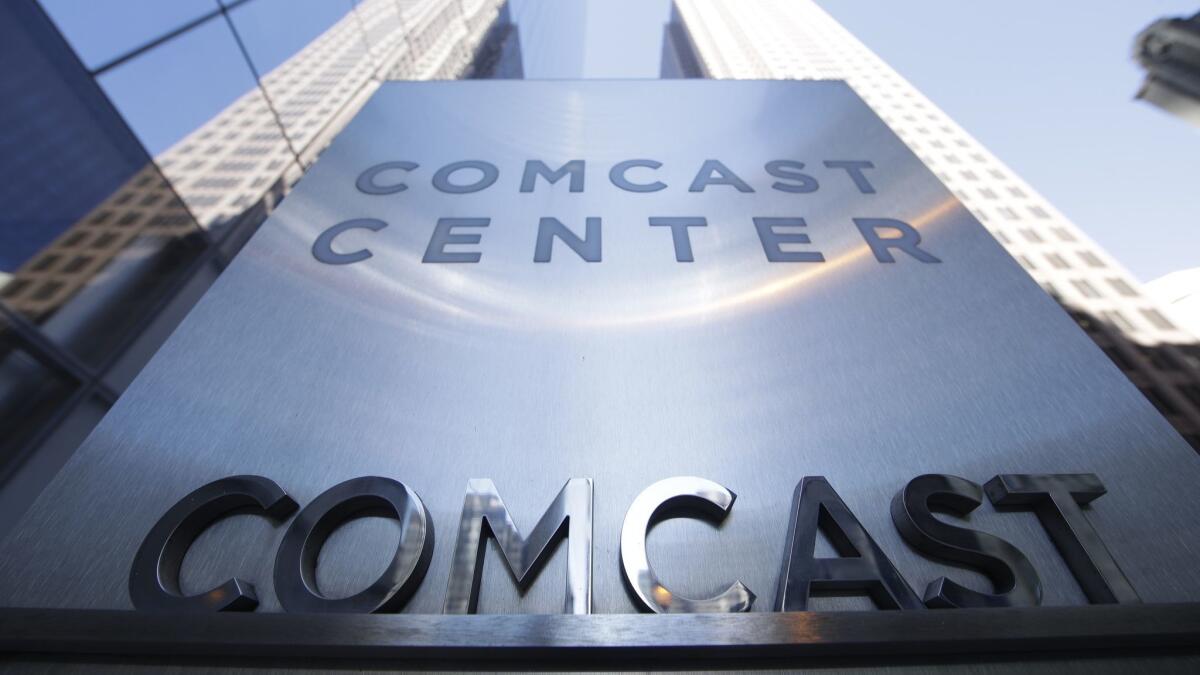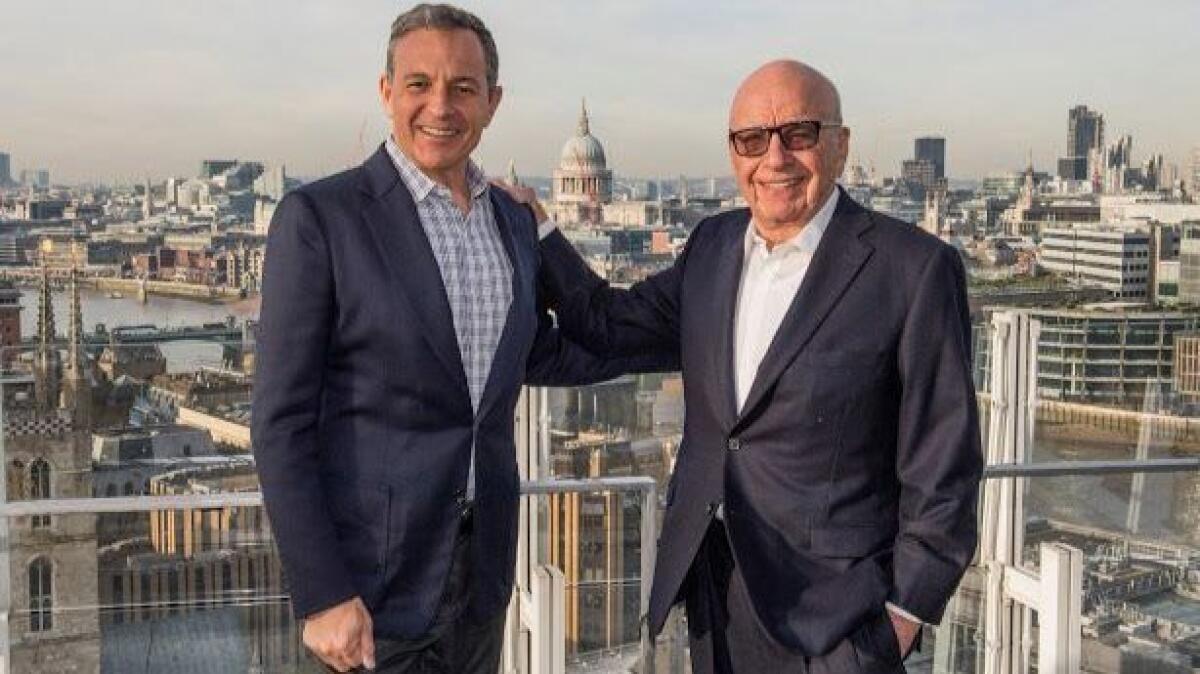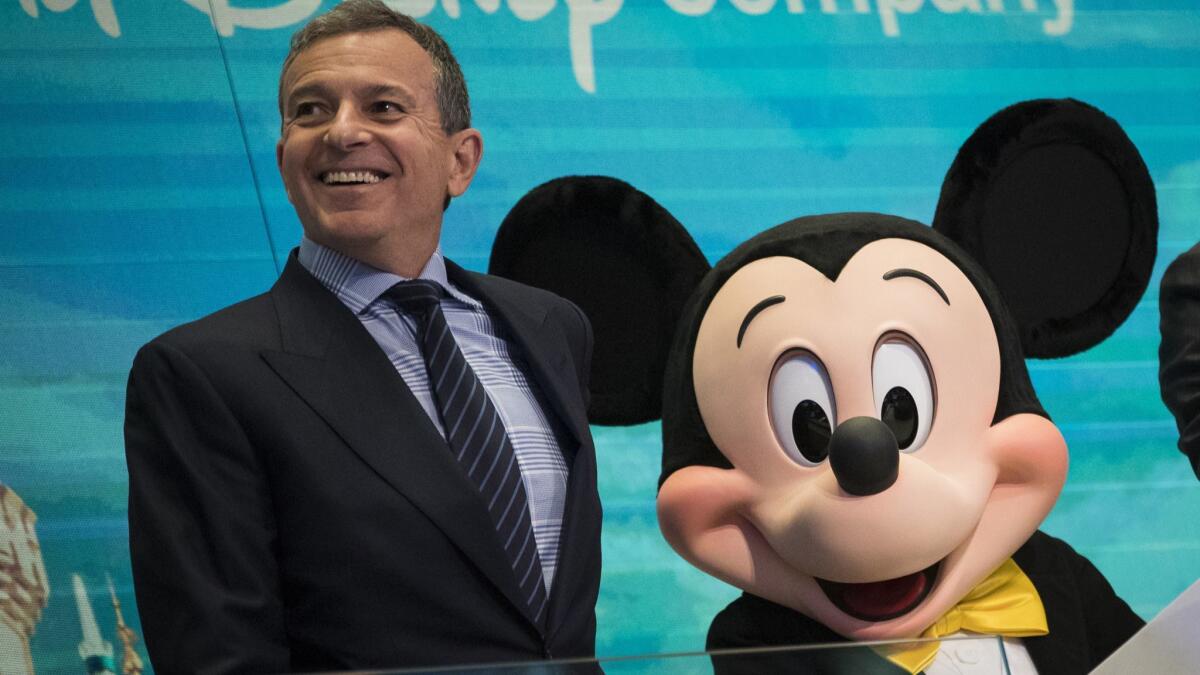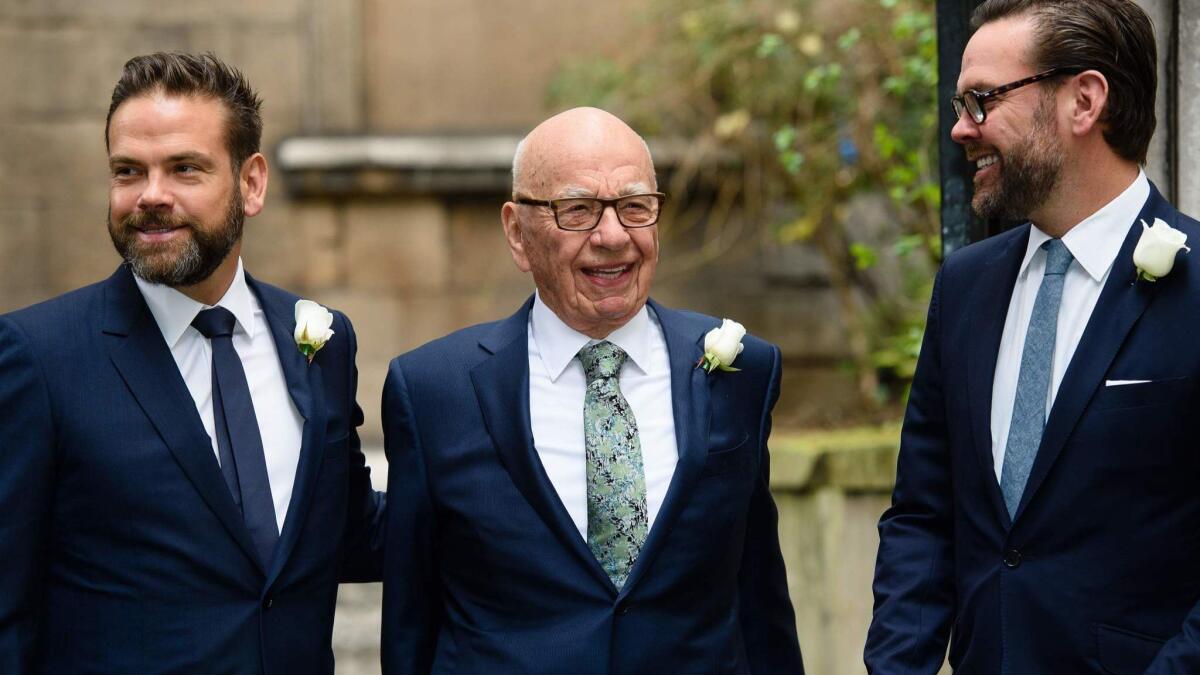Walt Disney Co. to claim 21st Century Fox entertainment assets after Comcast drops out of the bidding war

- Share via
The high-stakes drama over who would capture much of Rupert Murdoch’s media empire came to a close after Comcast Corp. said it was dropping out of the hunt for 21st Century Fox’s entertainment assets.
The announcement Thursday hands a major victory to Walt Disney Co. Chief Executive Bob Iger, who has championed the $71-billion purchase of the Fox assets, which include Fox’s prolific television and movie studios, cable channels FX and National Geographic, the controlling stake in streaming service Hulu, and international properties in India and Latin America.
Comcast’s pursuit of Fox had threatened to derail a deal that is considered essential to Disney’s future and Iger’s legacy — and one that is expected to transform Hollywood. The bulked up Disney would have unparalleled clout.
For Comcast, continuing to chase the Fox assets just became too expensive — and a big stretch for wary shareholders. Comcast would have had to offer more than $80 billion to stay competitive with Disney’s sweetened $71-billion bid. It has separately offered $34 billion for Sky, the European pay-TV service.
“From the very outset, Comcast has looked to be wrong-footed in its quixotic pursuit of Fox,” said Craig Moffett, a prominent cable analyst.
Comcast decided to devote its full attention to acquiring Sky, according to a person familiar with the company’s thinking who was not authorized to comment. And bidding for Fox would only have raised the price of London-based Sky, because Fox owns 39% of the satellite TV service that Murdoch co-founded in the late 1980s.
But Burbank-based Disney also wants Sky because it controls valuable programming rights, including popular soccer matches, and it provides pay-TV and internet service to more than 22 million customers in Britain, Ireland, Germany, Austria and Italy. Iger recently called Sky a “crown jewel,” so Disney and Fox may team up to top Comcast’s $34-billion proposal.
The decision was a blow to Comcast Chief Executive Brian L. Roberts, who aggressively pursued Fox, creating a showdown that frustrated Iger. It marked the third major retreat for Roberts. Comcast in 2004 was forced to abandon its hostile takeover of Disney amid a Comcast shareholder revolt. Then, in 2015, the Philadelphia company pulled the plug on buying Time Warner Cable after the Justice Department indicated that it would sue to block the merger. Charter Communications bought Time Warner Cable (now Spectrum) the following year.
“I’d like to congratulate Bob Iger and the team at Disney and commend the Murdoch family and Fox for creating such a desirable and respected company,” Roberts said in a statement.
Disney is taking the big swing because it feels it needs more scale, and more entertainment firepower, to compete with tech titans such as Netflix, Google, Facebook, Amazon.com and Apple, which have deep pockets, global businesses and direct relationships with consumers.
“Our incredible enthusiasm for this acquisition and the value it will create has continued to grow as we’ve come to know 21st Century Fox’s stellar array of talent and assets,” Iger said in a statement. “We’re extremely pleased with [Thursday’s] news, and our focus now is on completing the regulatory process and ultimately moving toward integrating our businesses.”
Disney shares gained 1.3% to $112.13 on Thursday. Comcast shares rose 2.6% to $34.91; Fox closed down less than 0.1% to $46.65.

Fox shareholders are scheduled to vote on the $71-billion Disney deal July 27.
For Murdoch, the sale will substantially shrink the empire he has spent more than half a century building. However, the 87-year-old mogul from Australia plans to hold onto core businesses: Fox News Channel, the Fox broadcast network, two national cable sports channels and a string of television stations, including KTTV Channel 11 in Los Angeles.
Most analysts speculated that Disney had the edge mainly because its deal posed fewer regulatory hurdles than a Comcast-Fox merger. Last month, the Justice Department gave a quick OK to Disney’s bid as long as it sells Fox’s 22 regional sports networks, including Prime Ticket and Fox Sports West in Los Angeles. The Disney-Fox merger review lasted just five months.
Although Disney and Fox have a similar asset mix, Comcast has the complication of owning pay-TV and internet services. Comcast is the nation’s largest broadband internet provider — a fact that has troubled the Justice Department before. When antitrust regulators said last week they would appeal the merger of AT&T Inc. and Time Warner Inc., the door slammed on Comcast’s chances of persuading Murdoch and his executives that a regulatory review of a Comcast-Fox tie-up would be speedy.
Comcast, which owns NBCUniversal, concluded that it had little chance of wresting Murdoch’s entertainment properties away from Disney. In late June, Disney upped its ante with an offer of $71.3 billion — or $38 a share — for the Fox businesses. Comcast had made a $65-billion all-cash bid.
Ultimately, Comcast could not overcome the huge head start enjoyed by Iger, who began courting Murdoch last summer over wine at Murdoch’s vineyard above Bel-Air. Talks heated up in the fall and, in December, Fox agreed to sell to Disney.
Murdoch twice rebuffed Roberts’ advances. He preferred Iger’s stock-and-cash proposal that would allow the Murdoch family to become major shareholders in Disney.
It was Murdoch who last year concluded that Fox may not be large enough to thrive in the digital age. Those same concerns drove AT&T to acquire Time Warner, which owned CNN, HBO and the Warner Bros. film and TV studios. That deal was finalized June 14, but has been challenged by the government. Similar concerns about adequate scale drove Discovery to purchase Scripps Networks Interactive, the home of HGTV and Food Channel, in March.

For Disney, the Fox properties deepen its trove of movie franchises and children’s titles, including Disney’s hit Pixar Animation films such as “Toy Story” and “Finding Nemo”; most of the Marvel comic book universe; “Star Wars” characters; “Ice Age”; “Avatar”; and “Alvin and the Chipmunks.” Disney — which already boasts such gems as Mickey Mouse, Elsa and Olaf from “Frozen,” and Winnie the Pooh — wanted to stockpile more content for a streaming service it plans to launch next year.
Comcast originally planned to use its shares to buy the Fox assets, but shareholders got skittish. Comcast’s stock has dropped nearly 20% this year. Because of that volatility, Comcast changed its approach and offered cash, which provided Murdoch and his family less upside long-term.

Relying on cash also made Comcast’s deal highly leveraged: The company faced the prospect of shouldering more than $100 billion in new debt to finance the purchase if it also lands Sky.
Doug Creutz, a media analyst with Cowen & Co., questioned both companies’ willingness to pay so much money for assets that might have already peaked, and why two media giants needed even more content to battle Netflix and Amazon.
“In our view, arguing that acquiring Fox will help win the war in the fight for the direct-to-consumer market is similar to Bob McNamara arguing in 1965 that he could win in Vietnam if he had more troops,” Creutz wrote in a research note this month. “We think both are fundamental misreads of the nature of the conflict.”
UPDATES:
4:30 p.m.: This article was updated with additional background.
8:50 a.m.: This article was updated with a statement from Disney CEO Bob Iger.
7:05 a.m.: This article was updated throughout with additional background and analyst commentary.
6:35 a.m.: This article was updated with staff reporting providing information about Disney’s bid, Comcast’s rationale for abandoning the prize and a statement from Comcast Chief Executive Brian Roberts. The Associated Press supplied the initial version.
This article was originally posted at 6 a.m.
More to Read
Inside the business of entertainment
The Wide Shot brings you news, analysis and insights on everything from streaming wars to production — and what it all means for the future.
You may occasionally receive promotional content from the Los Angeles Times.











